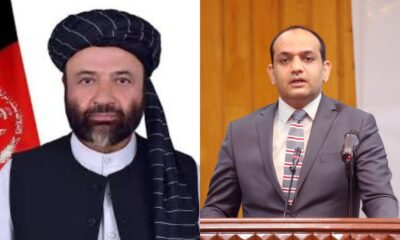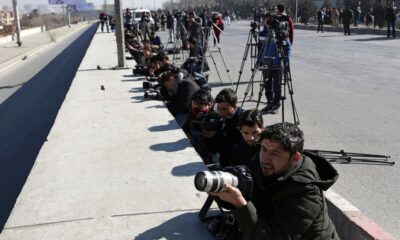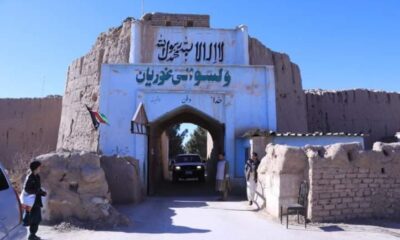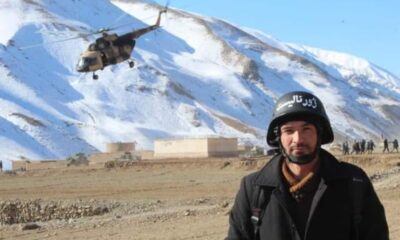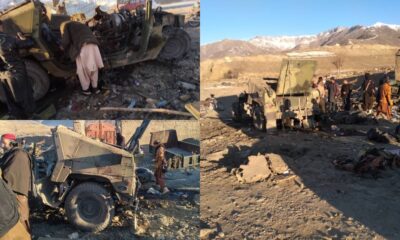Latest News
Afghanistan, Pakistan agree on shared vision for peace and stability
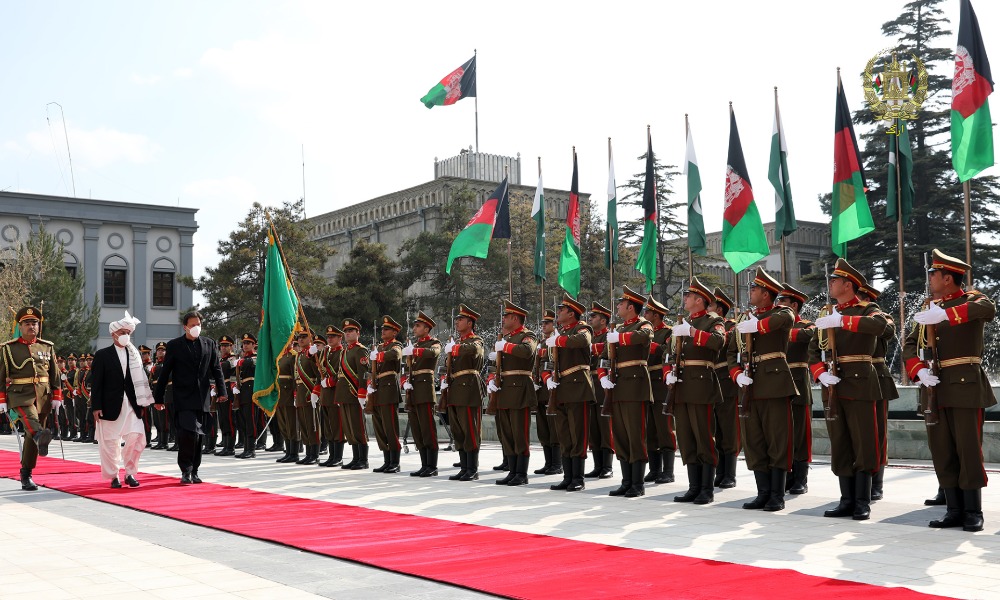
Pakistan’s Prime Minister Imran Khan on Thursday arrived on a day-long visit to Afghanistan where he met top Afghan government officials including President Ashraf Ghani.
According to Presidential Place the two side discussed a number of important issues pertaining to the Afghan peace process, bilateral relations and cooperation between the nations on mutual interest.
The Afghan Ministry of Foreign issued a statement on Thursday evening, saying the two countries have agreed on a shared vision to support peace and stability in both countries and the wider region.
“During the visit, an agreement was reached on Shared Vision to Support Peace and Stability in both countries and in the wider region.’ The document is highly important and the basic principles of the document are about cooperation between the two countries, cooperation in the field of peace, security and economic development,” the ministry statement said.
The document states that both parties welcomed the start of the Afghan peace process in Doha on 12 September 2020 and hoped that the talks will bring lasting peace and tranquility to the Islamic Republic of Afghanistan.
“They affirm their intention that both countries should look towards a future relationship built on trust, aiming to achieve tangible outcomes from that relationship. They note that closer and fraternal relations between the Islamic Republic of Afghanistan and the Islamic Republic of Pakistan would be beneficial, desirable and achievable, as indeed they had been in the decades before the latest conflict in Afghanistan,” the document says.
Afghanistan and Pakistan agreed that a shared vision for Afghanistan and Pakistan should comprise the following core elements:
1. High Ranking Representatives of Islamic Republic of Afghanistan and Islamic Republic of Pakistan met on 30 September 2020 and agreed upon the fundamental principle that Islamic Republic of Afghanistan and Islamic Republic of Pakistan should determine a new shared vision to help each other in furtherance of peace and stability in both their countries as well as the wider region.
2. They welcomed the start of Afghanistan Peace Process in Doha on 12 September 2020 and hoped that the talks will bring lasting peace and tranquility in Islamic Republic of Afghanistan. Talks have provided a unique opportunity to Afghans to decide their future without interference.
3. They affirm their intention that both countries should look towards a future relationship built on trust, aiming to achieve tangible outcomes from that relationship. They note that closer and fraternal relations between Islamic Republic of Afghanistan and Islamic Republic of Pakistan would be beneficial, desirable and achievable, as indeed they had been in the decades before the latest conflict in Afghanistan.
4. They agree, a shared vision for Afghanistan and Pakistan should comprise the following core elements:
a. That the Islamic Republic of Afghanistan and the Islamic Republic of Pakistan should enjoy a special relationship, founded on predictability, transparency, mutual and full respect for one another’s sovereignty, and on expanding and furthering their mutual interests through State-to-State mechanisms. That the mutually agreed cooperation framework under APAPPS provides a comprehensive, multi-sectoral mechanism for optimizing bilateral cooperation.
b. That the Islamic Republic of Afghanistan’s posture of “multi alignment” with other countries, pursuing a number of friendly relationships, presents a real opportunity for the two countries to exploit and conversely presents no threat.
c. That neither country could achieve lasting peace and stability without peace and stability in the other. Lasting peace implies peace-making which is wholly inclusive, encompasses the whole nation, and respects a democratic constitutional order in which rights of women and men remain inalienable and protected.
d. That neither country’s territory should be used for malicious purposes against the other’s territory, and that both countries should work together to identify and tackle enemies of peace, irreconcilables and those who undermine the peace process.
e. That the two countries should further their links and connections in a number of different ways, including through people to people contacts, business to business, government to government and, of particular note, security to security ties.
f. That regional connectivity should be broadened and deepened, with an emphasis on trade, free movement of people, goods and services, opening of trade and customs posts, and transport and energy infrastructure development, aiming for regional development dividends greater than what each country might expect to achieve alone.
g. That expeditious resolution of the refugee situation, i.e. the safe, time-bound and dignified return of refugees, would help the two countries address the humanitarian and socio-economic challenges associated with population displacement. Refugee returns would require resourcing, including donor support from the widest and the most inclusive possible donor community.
Part – 2
Implementation and Next Steps
1. The representatives of the Islamic Republic of Afghanistan and the Islamic Republic of Pakistan agree that timely progress to meet this vision would require close coordination, a structured dialogue, and willingness to take difficult and courageous decisions. They agree the need for urgency in their approach, with progress needed by the beginning of December 2020. Confirming commitments made on previous occasions, they agree to take rapid action on three main strands of activity, including identifying lead officials to take forward each activity:
a. By 15 December 2020: Re-energizing joint intelligence services-led work on analyzing, mapping and cooperating against enemies of peace and those undermining the peace process.
b. By 1st January 2021: A joint proposal for refugees return, elevating and intensifying treatment of this issue, to the point where credible and progressive action can start to be taken.
c. By 1st January 2021: A joint proposal to further regional connectivity, in a way which strengthens both Afghanistan and Pakistan, but also the wider region.
2. On Next Steps:
a. That the government leaders of the two countries will visit each other’s capital alternately to keep the momentum going. This initiative has commenced with the visit of the Honourable Prime Minister of the Islamic Republic of Pakistan to Kabul.
b. President Ghani would plan a reciprocal visit to Islamabad in the first quarter of 2021.
c. That the Islamic Republic of Afghanistan will share with the Islamic Republic of Pakistan summary of the key issues that are being discussed during the Afghanistan Peace Process.
3. Both sides agreed to keep this shared vision, its commitments, and previous commitments under regular review, to ensure measurable, clear and irreversible steps towards furthering closer and more productive relations between their two countries.
Latest News
Girls’ education is a ‘vital issue’ for Afghanistan: Karzai

Former president Hamid Karzai said in a meeting with Iran’s ambassador and special representative, Hassan Kazemi Qomi, that education of girls was a “vital issue” for Afghanistan.
Karzai said he appreciated Iran’s cooperation and its standing with the Afghan people, especially Iran’s contributions to education in Afghanistan.
During the meeting, Karzai said peace and stability in the region are in the interest of all regional countries.
Latest News
Uzbekistan’s humanitarian aid arrives in Balkh

A shipment of humanitarian aid from Uzbekistan was handed over on Thursday to the local officials of Balkh province in the trade port of Hairatan.
Local authorities said the aid, which includes flour, oil, wheat, sugar and meat, has been handed over by Uzbekistan’s Surkhandarya governor to the governor of Balkh.
The governor of Surkhandarya stated the purpose of sending this aid was to support the people of Afghanistan and stressed the need for the development of good relations between the two countries.
Latest News
Afghanistan’s problems caused more damage to Pakistan than 3 wars with India: Durrani

Islamabad’s special envoy for Afghanistan Asif Durrani said on Wednesday that Pakistan has suffered more due to Afghanistan’s internal situation than Pakistan has suffered in three wars with India in terms of blood spilt and finances drained.
Durrani said at a one-day International Conference titled “Pakistan in the Emerging Geopolitical Landscape”, which was organized by the Institute of Strategic Studies Islamabad (ISSI) and the German Friedrich Ebert Stiftung (FES), that over 80,000 Pakistanis died in the two decades of the War on Terror and that his country was still counting its dead and injured.
“After the withdrawal of NATO forces, it was hoped that peace in Afghanistan would bring peace to the region. However, such expectations were short-lived,” he said.
He also stated that attacks by the Tehreek-e-Taliban Pakistan (TTP) militant group on Pakistan’s border areas increased by 65 percent, while suicide attacks increased by 500 percent.
“The TTP’s enhanced attacks on Pakistan while using Afghan soil have been a serious concern for Pakistan. Another worrying aspect is the participation of Afghan nationals in these attacks,” he said.
Durrani also said Pakistan had suffered geopolitically since the Soviet Union invaded the neighboring country.
“The post-9/11 world order has negatively impacted Pakistan. Apart from losing 80,000 citizens’ lives, including 8,000 law enforcement agency personnel, the country’s economic opportunity cost is estimated at $150 billion,” Durrani said.
Talking about the future outlook for Pakistan in the regional context, Durrani said that while “our eastern neighbor is likely to continue with its anti-Pakistan pursuits, the western border poses an avoidable irritant in the short to medium term.”
However, he said Pakistan can overcome its difficulties with Afghanistan, including the TTP challenge.
-

 Latest News4 days ago
Latest News4 days agoPakistan’s frontiers minister stresses ‘dignified’ return of Afghan refugees
-

 Regional3 days ago
Regional3 days agoIranian president lands in Pakistan for three-day visit to mend ties
-

 Climate Change4 days ago
Climate Change4 days agoMassive river flooding expected in China, threatening millions
-

 Latest News2 days ago
Latest News2 days agoRashid Khan named AWCC’s brand ambassador
-

 Latest News4 days ago
Latest News4 days agoChinese keen to invest in Panjshir-Kabul water conduit project
-

 World4 days ago
World4 days agoTwo Japan navy helicopters crash, one body found, 7 missing
-

 Sport3 days ago
Sport3 days agoKolkata beat Bengaluru by one run in IPL as Kohli fumes at dismissal
-

 Sport3 days ago
Sport3 days agoACL: Aino Mina 3-0 Istiqlal Kabul; Attack Energy 3-0 Khadim


